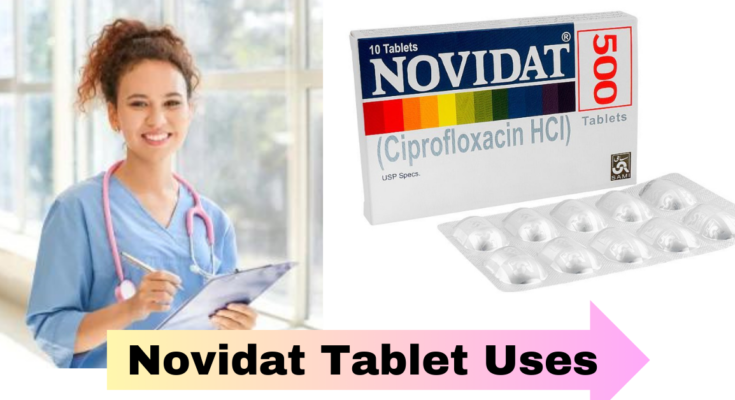Introduction
The Novidat tablet Uses is a powerful antimicrobial agent used primarily to combat bacterial infections. Its active ingredient, ciprofloxacin, belongs to the class of fluoroquinolone antibiotics. Unlike viral infections, which require different treatment approaches, Novidat specifically targets bacteria.
In this blog post, we’ll explore the various applications of Novidat, its mechanism of action, and essential precautions to consider when using this medication.
Uses of Novidat Tablet
- Urinary Tract Infections (UTIs):
- Novidat, containing ciprofloxacin, is a go-to choice for treating UTIs caused by bacteria.
- Its mechanism of action involves inhibiting bacterial DNA gyrase and topoisomerase IV, disrupting DNA replication and cell division.
- The standard treatment duration for UTIs with Novidat is typically a 14-day course.
- Patients experience relief from symptoms such as painful urination, frequent urges, and lower abdominal discomfort.
- Meningitis:
- Novidat plays a critical role in managing meningitis, an inflammation of the brain and spinal cord membranes.
- By effectively penetrating the cerebrospinal fluid, Novidat targets the causative bacteria responsible for meningitis.
- Early initiation of treatment is crucial to prevent complications and reduce mortality.
- Sinusitis:
- Novidat provides symptomatic relief for sinus infections.
- It helps alleviate pain, pressure, and congestion associated with acute or chronic sinusitis.
- The drug’s broad-spectrum activity covers common sinus pathogens.
- Skin Infections:
- Novidat demonstrates effectiveness in treating various cutaneous infections.
- These include skin abscesses, cellulitis, and infected wounds.
- Its tolerability profile makes it a valuable option for dermatological conditions.
Side Effects of Novidat Tablets
When using Novidat tablets, patients may experience various side effects. It’s essential to be aware of these potential reactions:
- Abdominal Pain:
- Some individuals may experience discomfort or cramps in the abdominal area.
- If severe or persistent, consult a healthcare professional promptly.
- Vomiting (Containing Coffee Grounds):
- Rarely, Novidat may cause vomiting with a coffee ground appearance.
- Seek medical attention if you notice this symptom.
- Blood in Stool:
- Novidat can occasionally lead to blood in the stool.
- Report any rectal bleeding to your doctor.
- Gastrointestinal Discomfort:
- Patients may experience general gastrointestinal discomfort, including bloating or nausea.
- Stay hydrated and follow your healthcare provider’s advice.
- Dizziness:
- Novidat can cause dizziness or lightheadedness.
- Be cautious when performing activities that require alertness.
- Skin Reactions:
- Skin rashes, itching, or hives may occur due to an allergic response.
- Discontinue Novidat and seek medical attention if you notice any skin changes.
Remember that individual responses vary, and not everyone will experience all these side effects. Always consult your healthcare provider for personalized guidance and to address any concerns.
Risks and Warnings
When using Novidat tablets, consider the following risks and precautions:
- Allergic Reactions to Ciprofloxacin:
- Some individuals may develop allergic responses to ciprofloxacin.
- Symptoms may include skin rash, itching, swelling, or difficulty breathing.
- Seek immediate medical attention if you experience any signs of an allergic reaction.
- Non-Susceptible Organisms and Antibiotic Resistance:
- While Novidat is effective against many bacteria, some organisms may be resistant.
- Overuse or inappropriate use of antibiotics can contribute to antibiotic resistance.
- Follow your healthcare provider’s instructions to minimize this risk.
- Diarrhea Due to Disruption of Gut Flora:
- Novidat can alter the balance of gut bacteria, leading to diarrhea.
- Maintain hydration and consider probiotics if prolonged diarrhea occurs.
- Tendinitis and Peripheral Neuropathy Precautions:
- Rarely, ciprofloxacin can cause tendinitis (inflammation of tendons) or peripheral neuropathy (nerve damage).
- Be cautious if you experience tendon pain or weakness.
- Report any unusual sensations in your extremities to your doctor.
Remember that individual responses vary, and it’s essential to discuss any concerns with your healthcare provider. If you have specific questions, feel free to ask!





